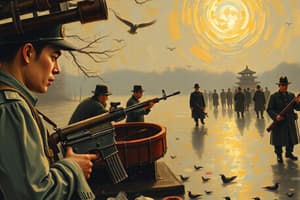Podcast
Questions and Answers
What is the maximum term length for the President of the Republic of Korea?
What is the maximum term length for the President of the Republic of Korea?
- 6 years with the possibility of re-election
- 5 years with no possibility of a second term (correct)
- 4 years with the possibility of re-election
- 5 years with the possibility of a second term
What powers does the President of the Republic of Korea possess?
What powers does the President of the Republic of Korea possess?
- Impeach members of the National Assembly
- Conduct foreign relations and appoint military leaders
- Declare war and dissolve the National Assembly
- Appoint the Chief Justice and propose legislation (correct)
How many members are there in the National Assembly of the Republic of Korea?
How many members are there in the National Assembly of the Republic of Korea?
- 300 members, with some appointed (correct)
- 350 members, including Senators
- 250 members, all appointed by political parties
- 300 members, all directly elected
What is the primary role of the judiciary in South Korea?
What is the primary role of the judiciary in South Korea?
Which event led to the suspension of President Roh Moo-hyun's executive power?
Which event led to the suspension of President Roh Moo-hyun's executive power?
What type of political system does the Republic of Korea have?
What type of political system does the Republic of Korea have?
Which body has the power to approve the nomination of the Prime Minister in the Republic of Korea?
Which body has the power to approve the nomination of the Prime Minister in the Republic of Korea?
Which of the following is NOT a function of the National Assembly?
Which of the following is NOT a function of the National Assembly?
What powers does the President have regarding wartime decisions?
What powers does the President have regarding wartime decisions?
What is the composition of the National Assembly in terms of its membership?
What is the composition of the National Assembly in terms of its membership?
Flashcards
President of South Korea
President of South Korea
The President of South Korea is directly elected by the people for a five-year term, with no second term allowed. They are the Head of State and Chief Executive, responsible for leading the country and overseeing the government.
Presidential Power in South Korea
Presidential Power in South Korea
The President of South Korea has significant power, including appointing the Prime Minister (with the National Assembly's approval), proposing legislation, and appointing the Chief Justice of the Supreme Court (with the National Assembly's approval).
South Korean National Assembly
South Korean National Assembly
The National Assembly is the unicameral legislature of South Korea, with 300 members serving four-year terms. 253 members are directly elected from districts, and 47 are appointed by political parties based on the proportional share of votes they received.
Functions of the National Assembly
Functions of the National Assembly
Signup and view all the flashcards
South Korea's Political System
South Korea's Political System
Signup and view all the flashcards
Impeachment Power
Impeachment Power
Signup and view all the flashcards
President's Limited Power
President's Limited Power
Signup and view all the flashcards
Constitution Revisions
Constitution Revisions
Signup and view all the flashcards
Sixth Republic
Sixth Republic
Signup and view all the flashcards
President's Nomination Power
President's Nomination Power
Signup and view all the flashcards
Study Notes
Korean Politics: Ninth Lecture
- Republic of Korea (ROK): A presidential representative democratic republic with a multi-party system.
- ROK Executive: The President is head of state and chief executive. Elected by direct popular vote for a five-year term. No second term allowed.
- ROK Executive Powers: Commander-in-chief of armed forces, power to declare war, appoints prime minister (subject to National Assembly approval).
- ROK Executive Limitations: Cannot dissolve National Assembly.
- Presidential Powers: Appoint Prime Minister, propose legislation, and appoint the Chief Justice of Supreme Court (subject to Assembly approval).
- National Assembly: Unicameral legislature with 300 members. 253 members are directly elected, 47 appointed by political parties proportional to vote share. Members serve four-year terms.
- National Assembly Roles: Lawmaking, approving national budget, impeaching President.
- Overall Structure: Executive, legislative, and judicial branches function independently. President nominates Supreme Court justices (with Assembly approval). Supreme Court is the highest judiciary body. Constitutional Court oversees questions of constitutionality.
- Constitutional Amendments: The constitution has been revised five times since 1948; each change marked a new republic, the current Sixth Republic started with amendments in 1987.
- President's Role (Specific Examples): The President acts as commander in chief, nominates Prime Ministers and the State Council, and is subject to impeachment procedures managed by the National Assembly.
- Impeachment Procedure (Specific Example): The impeachment of President Roh Moo-hyun in 2004 was reviewed by the Constitutional Court, resulting in his reinstatement.
- Legislative Branch Structure: The National Assembly has 300 members with 244 being elected in single-seat districts and 56 chosen through proportional representation; all serving four-year terms.
- Judicial Branch Structure: South Korean judiciary functions independently. Supreme Court justices appointed by President; confirmed with National Assembly approval. The Supreme Court is the highest judiciary body, and the Constitutional Court ensures constitutionality (of laws and other issues).
- Major Political Parties (Example): Saenuri Party
Studying That Suits You
Use AI to generate personalized quizzes and flashcards to suit your learning preferences.




